
Advances in Rehabilitation Science and Practice
Scope & Guideline
Advancing Knowledge, Enhancing Lives in Rehabilitation
Introduction
Aims and Scopes
- Patient-Centered Rehabilitation Research:
The journal emphasizes research that explores the experiences and perceptions of patients undergoing rehabilitation, contributing to a better understanding of their needs and outcomes. - Intervention Efficacy and Feasibility Studies:
A significant focus is placed on exploring the effectiveness and feasibility of various rehabilitation interventions, including novel techniques and technologies. - Cross-Cultural and Psychometric Evaluations:
The journal includes studies that validate assessment tools and questionnaires across different cultural contexts, ensuring that rehabilitation practices are inclusive and effective for diverse populations. - Health Policy and Systems Research:
It also addresses the importance of health policy in rehabilitation, advocating for research that strengthens health systems and improves access to rehabilitation services. - Innovative Methodologies in Rehabilitation Science:
The journal encourages the use of innovative methodologies, including qualitative research and systematic reviews, to advance the field of rehabilitation science.
Trending and Emerging
- Digital Health and Technology in Rehabilitation:
There is an increasing focus on the use of digital health technologies, such as virtual reality and telehealth, to enhance rehabilitation practices and patient engagement. - Post-Viral Conditions and Long COVID:
Research addressing post-viral rehabilitation, particularly concerning Long COVID, has gained prominence, highlighting the need for specialized rehabilitation strategies for individuals recovering from COVID-19. - Qualitative Research on Patient Experiences:
An emerging trend is the emphasis on qualitative research that captures the lived experiences of patients, particularly in relation to complex conditions such as stroke and amputations. - Rehabilitation for Specific Populations:
There is a growing interest in tailored rehabilitation approaches for specific populations, including stroke survivors, individuals with multiple sclerosis, and those with cognitive impairments. - Interdisciplinary Approaches to Rehabilitation:
The journal is increasingly featuring studies that adopt interdisciplinary methodologies, integrating insights from various fields to address rehabilitation challenges comprehensively.
Declining or Waning
- Traditional Rehabilitation Techniques:
Research focused on conventional rehabilitation techniques appears to be declining, as there is a growing interest in innovative and technology-driven interventions. - Generalized Pain Management Approaches:
Studies that discuss generalized pain management strategies without a specific focus on rehabilitation outcomes are less frequently published, indicating a shift towards more tailored and condition-specific approaches. - Non-Evidence-Based Practices:
There is a noticeable decline in the publication of papers that do not adhere to rigorous evidence-based practices, as the journal increasingly prioritizes high-quality, data-driven research. - Basic Descriptive Studies:
The prevalence of basic descriptive studies that do not contribute to theoretical or practical advancements in rehabilitation is decreasing, as the journal seeks more impactful and innovative research. - Aging and Rehabilitation Without Specific Focus:
Research on aging-related rehabilitation issues without a specific intervention or outcome focus has seen a decline, suggesting a move towards more targeted studies that address specific rehabilitation challenges faced by older adults.
Similar Journals
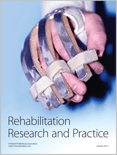
Rehabilitation Research and Practice
Connecting Professionals for Enhanced Rehabilitation Strategies.Rehabilitation Research and Practice is a distinguished open-access journal published by HINDAWI LTD, dedicated to advancing knowledge in the fields of rehabilitation, physical therapy, and sports therapy. With its ISSN 2090-2867 and E-ISSN 2090-2875, the journal has been a pivotal resource for researchers and practitioners since its inception in 2010. Based in Egypt and reaching an international audience, the journal encapsulates cutting-edge research and evidence-based practices that significantly contribute to patient care and rehabilitation strategies. Notably, it holds a reputable position in the Scopus rankings—42nd out of 161 in Medicine Rehabilitation and 74th out of 247 in Health Professions. The journal enjoys a Q2 status in the 2023 category quartiles, reflecting its influence and quality within the academic community. The journal's commitment to an open-access format not only enhances its visibility and accessibility but also fosters collaboration among professionals, making it an indispensable resource for anyone engaged in rehabilitation research and practice.
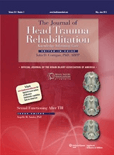
JOURNAL OF HEAD TRAUMA REHABILITATION
Exploring the future of head trauma management.JOURNAL OF HEAD TRAUMA REHABILITATION, published by LIPPINCOTT WILLIAMS & WILKINS, is a premier peer-reviewed journal dedicated to advancing the science and practice of managing head trauma and its rehabilitation. With an ISSN of 0885-9701 and an E-ISSN of 1550-509X, this journal has been a significant resource since its inception in 1986 and continues to provide critical insights into neurological and rehabilitative care, particularly as it spans the years until 2024. The journal boasts impressive rankings, including Q2 in Neurology (Clinical) and Q1 in both Physical Therapy, Sports Therapy and Rehabilitation, and Rehabilitation for 2023, underscoring its impact and relevance in the field. It is well-regarded in Scopus ranks as well, holding a rank of #27 out of 161 in Medicine Rehabilitation and #47 out of 247 in Health Professions. With no open access option available, the journal invites subscriptions and affiliations from academic institutions, healthcare professionals, and researchers committed to excellence in rehabilitation practices. Aimed at enhancing clinical techniques and methodologies, the JOURNAL OF HEAD TRAUMA REHABILITATION is essential reading for anyone invested in the recovery and rehabilitation of individuals with head injuries.
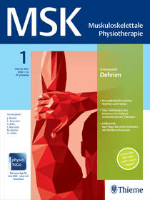
MSKMuskuloskelettale Physiotherapie
Unlocking the potential of musculoskeletal rehabilitation techniques.MSK Muskuloskelettale Physiotherapie is a leading academic journal dedicated to the field of musculoskeletal physiotherapy, exploring innovative practices, research findings, and clinical advancements. Published by GEORG THIEME VERLAG KG, a reputable name in medical publishing, this journal aims to serve as a vital resource for professionals, researchers, and students alike who are passionate about enhancing patient care and therapeutic techniques within the musculoskeletal domain. With its commitment to open access, MSK Muskuloskelettale Physiotherapie ensures that cutting-edge research is readily available to a global audience, facilitating the exchange of ideas and fostering collaboration across disciplines. As the field evolves, this journal seeks to provide a comprehensive platform for the latest developments, emerging methodologies, and transformative insights that are essential for advancing knowledge and practice in musculoskeletal health.
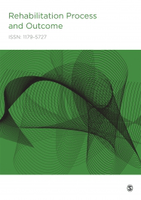
Rehabilitation Process and Outcome
Empowering practitioners with cutting-edge insights.Rehabilitation Process and Outcome, published by SAGE Publications Ltd, is a premier peer-reviewed journal dedicated to advancing the field of rehabilitation science. With an ISSN of 1179-5727 and an E-ISSN of 1179-5727, this open-access journal has been committed to disseminating high-quality research since its inception in 2008. The journal provides a vital platform for researchers, clinicians, and practitioners to share innovative studies, clinical practices, and advancements in rehabilitation methodologies. Its emphasis on open access ensures that findings are readily available to a global audience, promoting collaboration and knowledge exchange in the rehabilitation community. Rainier emphasis on practical outcomes supports the journal's mission to enhance patient care and recovery processes. Based in London, England, Rehabilitation Process and Outcome continues to foster significant discourse in the rehabilitation sector, making it an essential resource for those involved in enhancing recovery strategies and overall health outcomes.
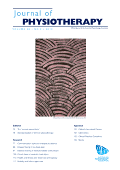
Journal of Physiotherapy
Exploring Cutting-Edge Techniques in PhysiotherapyThe Journal of Physiotherapy, published by the Australian Physiotherapy Association, is a leading peer-reviewed journal dedicated to advancing the field of physical therapy, sports therapy, and rehabilitation. With a stellar impact factor and ranked Q1 in the 2023 category of Physical Therapy, this journal serves as an essential resource for researchers, clinicians, and educators alike. Located in Australia, it features open access options that allow global dissemination of knowledge, enhancing the visibility of cutting-edge research from 2010 to 2024. With a commendable Scopus Rank of #5 out of 247 in its field, achieving the 98th percentile, the Journal of Physiotherapy is committed to enriching the evidence base within the profession and promoting best practices in physiotherapy. Whether you are searching for the latest clinical studies, innovative treatments, or comprehensive reviews, this journal provides a platform for high-quality scholarship that drives the profession forward.

Physiotherapy Practice and Research
Pioneering insights for the future of rehabilitation.Physiotherapy Practice and Research is a pivotal journal published by IOS PRESS that focuses on the dynamic field of rehabilitation and physiotherapy. Since its inception in 2009, this journal has provided a scholarly platform for researchers, clinicians, and students to disseminate innovative findings and practical applications in occupational therapy, sports medicine, and rehabilitation sciences. Although the journal currently holds Q3 and Q4 rankings in several categories, including occupational therapy and physical therapy, its impact in fostering research collaboration and informing practice is becoming increasingly important in advancing patient care and rehabilitation outcomes. With an ongoing commitment to open-access principles, the journal welcomes original research and review articles that address contemporary challenges and emerging practices within the field. As the journal continues to evolve, it aims to engage more deeply with the global research community, unlocking vital discussions that shape the future of physiotherapy.

Archives of Physiotherapy
Exploring New Frontiers in Physical RehabilitationArchives of Physiotherapy is a prominent peer-reviewed journal published by SPRINGERNATURE, dedicated to advancing knowledge and practice in the fields of physical therapy, sports therapy, and rehabilitation. Since its inception in 2015, this Open Access journal has contributed to the dissemination of research that informs clinical practice and educates future professionals. With a commendable impact reflected in its Scopus rankings—placing it in the 72nd and 69th percentiles for Rehabilitation and Physical Therapy respectively—Archives of Physiotherapy stands as a critical resource for researchers, practitioners, and students striving to stay at the forefront of innovative therapy techniques and rehabilitative practices. The journal’s strategic focus on emerging trends and evidence-based methodologies makes it an invaluable platform for scholarly exchange and collaboration in the evolving landscape of healthcare. Now, serving audiences across the globe from its base in the United Kingdom, it is positioned to impact the future of rehabilitation science during its converged years from 2015 to 2024.
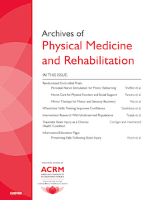
ARCHIVES OF PHYSICAL MEDICINE AND REHABILITATION
Transforming Rehabilitation Through Innovative ResearchArchives of Physical Medicine and Rehabilitation, published by W B Saunders Co-Elsevier Inc., is a premier academic journal dedicated to the fields of physical therapy, sports therapy, and rehabilitation. Since its inception in 1945, it has evolved to provide a platform for groundbreaking research and insightful discourse that shapes clinical practice and enhances patient outcomes. With a notable impact factor and ranking in the top quartiles of its respective categories, this journal consistently showcases the most innovative studies, systematic reviews, and evidence-based practices that drive forward the understanding of rehabilitation medicine. As a vital resource for researchers, healthcare professionals, and students alike, it contributes significantly to the advancement of knowledge in rehabilitation sciences. With an aim to bridge the gap between research and practice, the journal invites contributions from all disciplines related to physical medicine and rehabilitation, fostering a collaborative environment that promotes the dissemination of impactful findings.
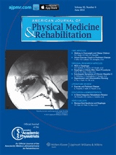
AMERICAN JOURNAL OF PHYSICAL MEDICINE & REHABILITATION
Leading the Way in Rehabilitation Research and EducationAmerican Journal of Physical Medicine & Rehabilitation, published by Lippincott Williams & Wilkins, is a leading journal in the field of rehabilitation, dedicated to advancing knowledge in physical medicine and rehabilitation practices. With an established history from 1988 to 2024, this journal serves as a vital resource for clinicians, researchers, and students interested in the multifaceted aspects of rehabilitation science. It holds a commendable Q2 ranking in the Physical Therapy and Sports Therapy fields and a prestigious Q1 position in Rehabilitation, reflecting its impact and relevance in the academic community. The journal's Scopus rankings further highlight its significance, placing it among the top percentile for both rehabilitation medicine and physical therapy. Although it does not currently offer open access options, its accessibility through institutional subscriptions ensures widespread reach. By publishing high-quality research, clinical studies, and reviews, the American Journal of Physical Medicine & Rehabilitation plays a critical role in shaping contemporary rehabilitation practices and improving patient outcomes.

Journal of Cardiopulmonary Rehabilitation and Prevention
Driving excellence in cardiology and pulmonary medicine.The Journal of Cardiopulmonary Rehabilitation and Prevention, published by Lippincott Williams & Wilkins, serves as a pivotal platform for the dissemination of cutting-edge research in the fields of cardiology, pulmonary medicine, and rehabilitation. With its ISSN 1932-7501 and E-ISSN 1932-751X, this esteemed journal is based in the United States and is recognized for its exceptional impact—ranking in the Q1 quartile for its categories in the 2023 metrics. The journal provides a unique blend of peer-reviewed articles that encompass innovative approaches to rehabilitation and prevention strategies, addressing the critical intersections of cardiovascular and pulmonary health. Accessibility to high-quality research is essential for healthcare professionals and researchers alike, and although the journal embraces a traditional subscription model, its rich content remains pivotal for enhancing clinical practices and advancing academic inquiry. By focusing on evidence-based practices and new therapeutics, the Journal of Cardiopulmonary Rehabilitation and Prevention continues to foster advancements in patient care and outcomes, positioning itself as an indispensable resource for those dedicated to improving cardiopulmonary health.